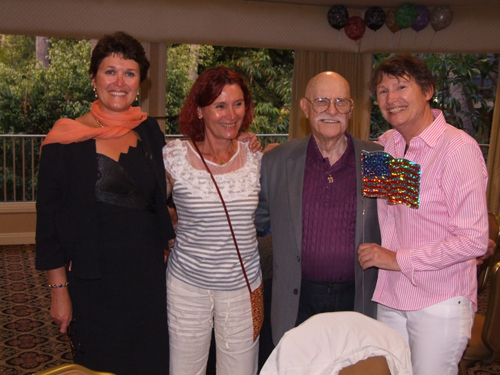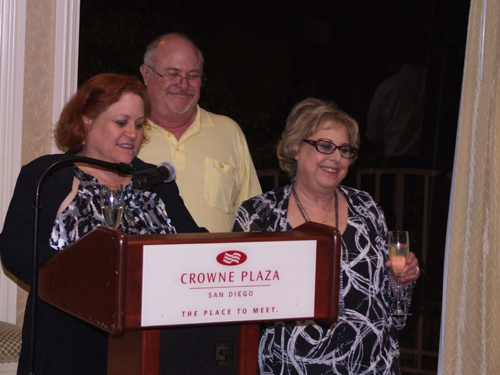
By Donald H. Harrison

SAN DIEGO — Of the 70 family members and friends who gathered Saturday night, May 26, at the Crown Plaza Hanalei Hotel to celebrate the 90th birthday of World War II POW Sy Brenner, three sisters from France had only met the guest of honor the night before, but nevertheless were the sentimental celebrities of the evening.
Gwenola, Nolwenn, and Soazig were the children of Zaig and Polig Monjarret, a French couple from Brittany whom the Nazi Germans captured at their farm and relocated as slave laborers to Ludwigsburg, Germany, near Stalag -V, the POW camp where U.S. Army medic Brenner was held as a prisoner.
As told in Brenner’s memoir, The Night I Got Killed, there were German guards at Stalag V near the end of the war who worked with resistance forces opposing the Nazi regime. These guards smuggled Brenner out of the camp periodically to meet with a woman whom Brenner only knew as “The Lady,” who gave the medic messages to dispense to a resistance cell in the POW camp. He first spotted the Monjarrets one evening as he was returning to the POW camp, and he feared for his life thinking that they were Gestapo agents. But after he drew closer, he learned that just the reverse, they were slave laborers and like himself–a soldier who had to hide his Jewish identity–they were victims of the Nazis. Zaig spoke to Brenner in English as her husband, Polig, traced his foot in the dirt, listening but not understanding.
According to Brenner’s daughter, Mo Bailey, Brenner later learned that Polig was afraid that the American POW was trying to make a pass at his wife, but such was not the case. As Brenner continued to ferry messages between ‘The Lady’ in the Resistance and the POW camp, the threesome met again and again, becoming fast friends in the closing months of the war. They stayed in touch over the next 50 years, with members of Brenner’s large family during the years of the European Recovery Program sending CARE packages to the Monjarrets, whose farm had been ruined after its confiscation by the Nazis. Polig later learned English, and one day surprised Brenner with a long-distance phone call and English-language conversation, Bailey recalled.
As Polig and Zaig’s middle daughter, Nolwenn Monjarret, a performer of Brittany’s folksongs, told the story, in 1995, 50 years after the end of the war, her parents had a mutually exciting reunion with Brenner in Paris. But except for the fact that she and her sisters were aware that their parents had known Brenner in the war, they were not privy to the details. After their parents died, however, they started learning more about their parents’ lives during the war. Brenner’s book was a resource.
She said that her parents were “pleased” to have met Sy (whom she called by the name he was called in the U.S. Army: “Sam”) because “Sam is a wonderful person, and very joyful, and also our parents were inventive, curious persons, and they became friends immediately. Sam did not change. He is as young and joyful now as he was then.”
Recently Brenner tried to locate Polig, unaware that he had followed Zaig in death. Nolwenn and Brenner had a conversation on the phone, which led to email exchanges, and eventually a plea from Brenner’s own children — Donna Cohen, Mo Bailey, and Ron Brenner — that the Monjarret sisters consider coming to San Diego for the 90th birthday celebration, which coincidentally and fittingly was being held on America’s Memorial Day weekend.
The sisters arrived on Friday, and accompanied by Dylan Bailey, Sy’s grandson, walked into Ron Brenner’s home, where Sy was visiting. Wondering what his grandson was doing with three older women, Sy received in amazement the news that these were in fact the three daughters of Zaig and Polig. According to Mo Bailey, Brenner “just flipped, I got pictures of them hugging and crying.”
When they first received the invitation, said Nolwenn, they thought no, it wouldn’t be possible, San Diego is too far from Lorient, the town in Brittany where they live. “After a while, we said ‘yes we will do it,’ she added. “We thought ‘Sam was not in Germany by accident; he was there because he was trying to save France. And we thought of that and we said ‘yes we will go’ and we discovered the whole family. It is very moving for us.”
It was likewise for the Brenner clan. With a catch in her voice, Bailey said that for most of his life her father was unwilling to talk about his experiences in the war, experiences that still cause him nightmares when he remembers being thrown by sadistic guards into a closet with a decomposing corpse and left there, or being required to perform an amputation without anesthetic or proper instruments on a fellow prisoner. After learning about Post-Traumatic Stress Disorder (PTSD) and realizing that PTSD was what he was suffering from, Brenner gradually opened up and began to talk about his war experiences and how to overcome the traumatic memories.

During that process, said Bailey, the relationship between Brenner and his children became closer than it ever had been, and they came to learn more of the Monjarrets.
“It is like there was this story about them that became more real, and then to find them and connect with them; it was like we always knew them without knowing them.”
Brenner, at a podium to thank his guests, said of the Monjarret sisters: “They surprised me last night and they blew my mind. They told me that they heard about me all their lives…. That’s fantastic!”
He added: “I want to tell you how I feel tonight. I feel loved. I am wearing a purple shirt because that was my (late) wife Resa’s favorite color, and as some of you have noticed I am wearing a chai. And for those of you who don’t know what a chai is, in Hebrew it has two meanings: 18 and good health!”
*
Harrison is editor of San Diego Jewish World. He may be contacted at donald.harrison@sdjewishworld.com
Don,
Thank you for the story. I have had so many people contact me and mention that they’ve seen this. You have made me world famous!
It is wonderful and a copy has already been sent to the Monjarret sisters in France!
Thank you again. You’re a treasured and helpful friend.]
Sy